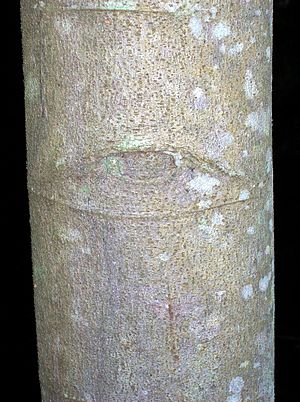White Ash facts for kids
Quick facts for kids White Ash |
|
|---|---|
 |
|
| Scientific classification | |
| Genus: |
Alphitonia
|
| Species: |
petriei
|
The Alphitonia petriei, often called the white ash, is a type of tree that grows in rainforests. It belongs to the plant family called Rhamnaceae. This tree is found in the eastern and northern parts of Australia. People also know it by other names like red ash, white-leaf, pink almond, and pink ash.
Scientists first collected this tree near the Johnston River, close to Kuranda, in 1925. K.W. Braid named it. The scientists chose the name petriei to honor W.R. Petrie, who helped them realize this tree was a special kind.
Contents
What Does the White Ash Tree Look Like?
The white ash tree is usually a small tree, growing to about 20 metres (66 feet) (65 feet) tall. But in Queensland, some have been found to be much taller, reaching up to 40 metres (130 feet) (130 feet) with a wide trunk of 60 cm (2 feet).
Bark and Scent
The trunk and bigger branches of the white ash tree have grey bark that looks cracked. In Queensland, the bark can be a darker brown. If you peel or bruise the bark, it gives off a strong smell. This scent is like liniment, which is a type of soothing oil. Some people say it smells like oil of wintergreen.
Leaves, Flowers, and Fruit
The leaves of the white ash tree grow one after another on the smaller branches. They are simple and narrow, measuring about 7–15 cm (3–6 in) (3 to 6 inches) long. The top side of the leaves is a shiny dark green. The underside is covered with fine white hairs.
The flowers are tiny, only about 0.5 cm (0.2 inches) across, and are creamy in color. They have five petals. These small flowers grow in clusters at the ends of branches or between the leaves. The white ash tree flowers from September to November.
After the flowers, the tree produces round, dark fruits. These fruits are about 1 to 1.5 cm (0.4 to 0.6 inches) wide. They appear from February to July.
Where Does the White Ash Tree Grow?
You can find the white ash tree in rainforests along the coast. It also grows in areas where rainforests meet eucalyptus forests. Its range stretches from Darwin and Thursday Island in northern Australia. From there, it goes south along the eastern coast to the Upper Orara River in New South Wales. Farm animals sometimes eat the leaves and young shoots of this tree.

